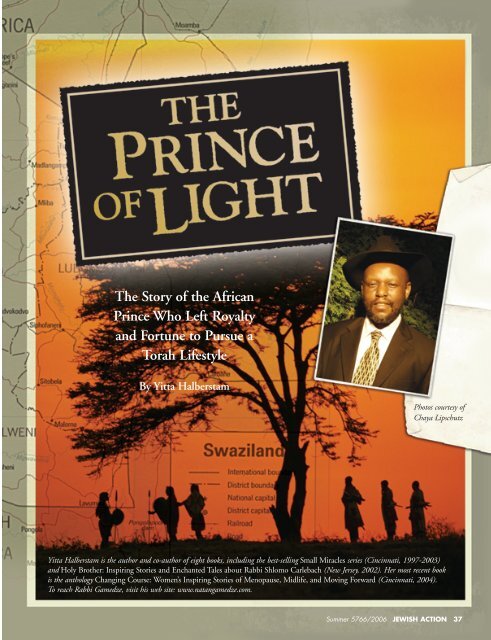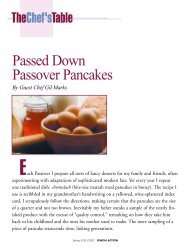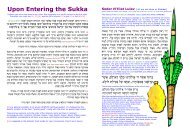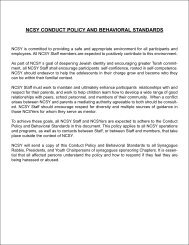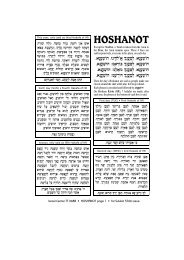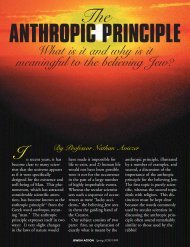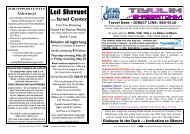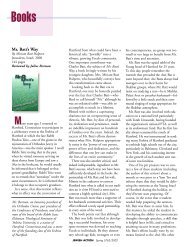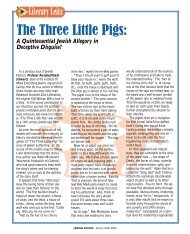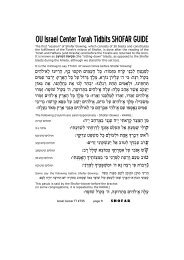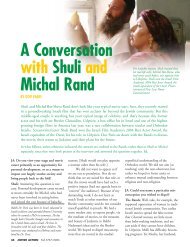The Story of the African Prince Who Left Royalty and Fortune to ...
The Story of the African Prince Who Left Royalty and Fortune to ...
The Story of the African Prince Who Left Royalty and Fortune to ...
You also want an ePaper? Increase the reach of your titles
YUMPU automatically turns print PDFs into web optimized ePapers that Google loves.
<strong>The</strong> <strong>S<strong>to</strong>ry</strong> <strong>of</strong> <strong>the</strong> <strong>African</strong><br />
<strong>Prince</strong> <strong>Who</strong> <strong>Left</strong> <strong>Royalty</strong><br />
<strong>and</strong> <strong>Fortune</strong> <strong>to</strong> Pursue a<br />
Torah Lifestyle<br />
By Yitta Halberstam<br />
Pho<strong>to</strong>s courtesy <strong>of</strong><br />
Chaya Lipschutz<br />
Yitta Halberstam is <strong>the</strong> author <strong>and</strong> co-author <strong>of</strong> eight books, including <strong>the</strong> best-selling Small Miracles series (Cincinnati, 1997-2003)<br />
<strong>and</strong> Holy Bro<strong>the</strong>r: Inspiring S<strong>to</strong>ries <strong>and</strong> Enchanted Tales about Rabbi Shlomo Carlebach (New Jersey, 2002). Her most recent book<br />
is <strong>the</strong> anthology Changing Course: Women’s Inspiring S<strong>to</strong>ries <strong>of</strong> Menopause, Midlife, <strong>and</strong> Moving Forward (Cincinnati, 2004).<br />
To reach Rabbi Gamedze, visit his web site: www.natangamedze.com.<br />
Summer 5766/2006 JEWISH ACTION 37
38 JEWISH ACTION Summer 5766/2006<br />
As Rabbi Natan Gamedze likes <strong>to</strong><br />
tell it, his path <strong>to</strong> self-discovery—his<br />
transformation from prince <strong>to</strong> rabbi—<br />
was paved with chance encounters, mystical<br />
experiences, strange signs <strong>and</strong><br />
guideposts, all orchestrated <strong>to</strong> lead him<br />
<strong>to</strong> his present life as an observant Jew. A<br />
linguist with an honors degree from<br />
Oxford, Rabbi Gamedze is <strong>the</strong> gr<strong>and</strong>son<br />
<strong>of</strong> a former king <strong>of</strong> Swazil<strong>and</strong> 1 <strong>and</strong> scion<br />
<strong>of</strong> <strong>the</strong> royal Gamedze dynasty that had<br />
ruled Swazil<strong>and</strong> for generations.<br />
He first encountered Judaism in<br />
college, while taking a class in Italian literature.<br />
Rabbi Gamedze, who is fluent<br />
in twelve languages, noticed a fellow<br />
student scribbling in a script he did not<br />
recognize. He was intrigued. After class,<br />
<strong>the</strong> student <strong>to</strong>ld him it was Hebrew.<br />
“I’m usually slow <strong>to</strong> make decisions,”<br />
admits Rabbi Gamedze. “But right after<br />
I spoke <strong>to</strong> <strong>the</strong> student, I dashed down<br />
<strong>to</strong> <strong>the</strong> Languages Department <strong>and</strong><br />
signed up for an introduc<strong>to</strong>ry course in<br />
Hebrew. I [can’t] really explain my<br />
impulsiveness ... something just made<br />
me do it.” Six months later, <strong>the</strong> language<br />
whiz had mastered basic Hebrew,<br />
<strong>and</strong> was taking Hebrew classes with a<br />
native Israeli. “During <strong>the</strong> first session, I<br />
was listening <strong>to</strong> a tape in Hebrew <strong>of</strong><br />
parashat Lech Lecha, <strong>and</strong> <strong>the</strong> words resonated,”<br />
says Rabbi Gamedze. “I felt<br />
that <strong>the</strong> text was talking <strong>to</strong> me. Hebrew<br />
seemed <strong>to</strong> speak <strong>to</strong> my soul, <strong>and</strong> I started<br />
reading more <strong>and</strong> more texts until I<br />
came <strong>to</strong> Rambam’s Mishneh Torah,<br />
which struck a huge chord. I loved it. I<br />
carried <strong>the</strong> sefer with me wherever I<br />
went, <strong>and</strong> I shared its teachings with my<br />
Jewish friends on campus, who were<br />
assimilated <strong>and</strong> illiterate about <strong>the</strong>ir<br />
own tradition. Ironically, my enthusiasm<br />
for <strong>the</strong>ir religion turned <strong>the</strong>m on <strong>to</strong><br />
Judaism, <strong>and</strong> <strong>the</strong>y began studying <strong>the</strong>mselves.<br />
It was a bit strange that <strong>the</strong> very<br />
person who ended up bringing <strong>the</strong>m<br />
closer <strong>to</strong> Judaism wasn’t Jewish himself.”<br />
One day, in <strong>the</strong> spring <strong>of</strong> 1988,<br />
Rabbi Gamedze had one <strong>of</strong> those mystical<br />
encounters he refers <strong>to</strong> <strong>of</strong>ten. “I was<br />
sitting in <strong>the</strong> campus restaurant, having<br />
a cup <strong>of</strong> c<strong>of</strong>fee, when a stranger walked<br />
in <strong>and</strong> started speaking Hebrew <strong>to</strong> me,”<br />
he says. Rabbi Gamedze had never met<br />
this man before, but <strong>the</strong> man—a visiting<br />
pr<strong>of</strong>essor from Israel—seemed <strong>to</strong><br />
know all about him. “Would you be<br />
interested in pursuing a PhD in languages<br />
at Hebrew University in<br />
Jerusalem ... on a full scholarship?” <strong>the</strong><br />
pr<strong>of</strong>essor asked.<br />
If <strong>the</strong>re was one value <strong>the</strong><br />
Gamedze family cherished it was education.<br />
Rabbi Gamedze’s fa<strong>the</strong>r, Aron<br />
Bheki<strong>the</strong>mba Gamedze—who had abdicated<br />
<strong>the</strong> throne years before in order <strong>to</strong><br />
become a Christian (not <strong>the</strong> national<br />
religion) 2 —had <strong>of</strong>ten <strong>to</strong>ld his son that<br />
“people can take everything away from<br />
you, except for an education.” Despite<br />
his abdication, Aron Gamedze continued<br />
<strong>to</strong> occupy some <strong>of</strong> <strong>the</strong> most important<br />
<strong>and</strong> powerful positions in<br />
Swazil<strong>and</strong>, partly because <strong>of</strong> his royal<br />
heritage but primarily because <strong>of</strong> his<br />
extensive educational background <strong>and</strong><br />
intellectual finesse. He served variously<br />
as <strong>the</strong> country’s ambassador <strong>to</strong> Great<br />
Britain, minister <strong>of</strong> education <strong>and</strong> chief<br />
liaison <strong>of</strong>ficer between Swazil<strong>and</strong> <strong>and</strong><br />
Britain after <strong>the</strong> former first won its<br />
independence in 1968. Most significantly,<br />
Rabbi Gamedze’s fa<strong>the</strong>r was<br />
known as <strong>the</strong> “Eye <strong>of</strong> <strong>the</strong> King” in his<br />
role as chief adviser <strong>to</strong> <strong>the</strong> current<br />
monarch. Rabbi Gamedze’s mo<strong>the</strong>r was<br />
an English schoolteacher who shared<br />
her husb<strong>and</strong>’s convictions about education.<br />
When <strong>the</strong>y learned <strong>of</strong> <strong>the</strong> <strong>of</strong>fer<br />
that had been made <strong>to</strong> <strong>the</strong>ir son, <strong>the</strong>y<br />
encouraged him <strong>to</strong> pursue it, never once<br />
considering that living in <strong>the</strong> Jewish<br />
State might imperil his Christian beliefs.<br />
It would be seventeen years before <strong>the</strong>y<br />
would see <strong>the</strong>ir son again.<br />
“When I left South Africa, I had a<br />
strong feeling that it was for good, that<br />
I wasn’t just leaving for a few years, but<br />
that I was getting myself in<strong>to</strong> something<br />
much bigger than that,” says Rabbi<br />
Gamedze. “I felt that <strong>the</strong> appearance <strong>of</strong><br />
<strong>the</strong> pr<strong>of</strong>essor that day was not just a<br />
coincidence—it was a sign from<br />
Hashem. I’ve always believed that<br />
Hashem is guiding me, <strong>and</strong> that I have<br />
<strong>to</strong> be attuned <strong>to</strong> <strong>the</strong> signs He drops. My<br />
mot<strong>to</strong> was: ‘Seize <strong>the</strong> signs, even if you<br />
don’t know where <strong>the</strong>y will take you.’ In<br />
this particular case, <strong>the</strong>y <strong>to</strong>ok me <strong>to</strong><br />
Jerusalem.”<br />
As soon as Rabbi Gamedze<br />
stepped <strong>of</strong>f <strong>the</strong> plane, he was overcome<br />
by <strong>the</strong> sensation <strong>of</strong> everything being<br />
very familiar. “I felt that I had come<br />
home,” he remembers. Although chaos<br />
<strong>and</strong> frenzy characterized <strong>the</strong> Jerusalem<br />
that he traveled <strong>to</strong> in Oc<strong>to</strong>ber 1988—<br />
political c<strong>and</strong>idates campaigned raucously<br />
in <strong>the</strong> streets while student<br />
strikes engulfed Hebrew University, paralyzing<br />
it for two weeks—his enthusiasm<br />
only grew. <strong>The</strong> crowds, <strong>the</strong> disorder,<br />
<strong>the</strong> vitality, <strong>the</strong> life: ”I just loved it.”<br />
What he didn’t love, however, was<br />
<strong>the</strong> disappointing course <strong>of</strong> study at<br />
Hebrew University. “For two years I was<br />
taking classes in Biblical Hebrew, modern<br />
Hebrew, Aramaic, but I felt that<br />
something was lacking,” Rabbi<br />
Gamedze says. “I couldn’t put my finger<br />
on it, but a certain dimension that I had<br />
found in Rambam was absent from my<br />
studies. I was in a qu<strong>and</strong>ary ... trying <strong>to</strong><br />
figure out what Hebrew had <strong>to</strong> tell me<br />
... <strong>and</strong> I didn’t know how <strong>to</strong> progress.<br />
<strong>The</strong>n I got a call from <strong>the</strong> Jewish<br />
friends I had left behind in South<br />
Africa.”<br />
Rabbi Gamedze remembered that<br />
when he introduced his friends <strong>to</strong><br />
Mishneh Torah, he had sparked <strong>the</strong>ir<br />
interest in Judaism, but he hadn’t<br />
known <strong>to</strong> what extent. “It turned out <strong>to</strong><br />
be not just intellectual curiosity on <strong>the</strong>ir<br />
part,” says Rabbi Gamedze. <strong>The</strong>y had<br />
completely returned <strong>to</strong> <strong>the</strong>ir faith. In<br />
two years’ time, <strong>the</strong>y had become ba’alei<br />
teshuvah, <strong>and</strong> were now studying at Ohr<br />
Somayach in Israel. “Come join us,”<br />
<strong>the</strong>y urged him.<br />
When Rabbi Gamedze met his<br />
old friends, he was dumbstruck by <strong>the</strong>ir<br />
radically changed appearances (<strong>the</strong>y<br />
were now wearing tzitzit <strong>and</strong> yarmulkes)<br />
<strong>and</strong> intrigued <strong>to</strong> learn that he had<br />
played such a pivotal role in <strong>the</strong>ir transformations.<br />
“How do you explain that a<br />
non-Jew brought Jews closer <strong>to</strong> <strong>the</strong>ir<br />
heritage?” <strong>the</strong>y challenged him. In<br />
1990, Rabbi Gamedze left Hebrew<br />
University <strong>to</strong> enroll full-time at Ohr<br />
Somayach, where he ultimately stayed<br />
for five years. His two greatest influences<br />
<strong>the</strong>re were <strong>the</strong> mashgiach, Rabbi<br />
Yehuda Samet, <strong>and</strong> Rabbi Nachman<br />
Bulman, z”l, with whom he learned<br />
Michtav MeEliyahu one-on-one. He
loved his studies, but emotionally he felt<br />
uneasy, constantly <strong>to</strong>rmented by one<br />
question: If Hashem wanted me <strong>to</strong> be a<br />
Jew, <strong>the</strong>n why wasn’t I just born one?<br />
Several months in<strong>to</strong> his studies at<br />
Ohr Somayach, Rabbi Gamedze decided<br />
that he needed a break. “Everything<br />
was becoming <strong>to</strong>o intense,” he recalls. “I<br />
decided <strong>to</strong> travel <strong>to</strong> Rome—<strong>the</strong> ‘least<br />
Jewish place in <strong>the</strong> world’—on holiday,<br />
where I hoped I could put Judaism on<br />
<strong>the</strong> back burner. But <strong>the</strong> reverse happened.<br />
Wherever I went, whatever I<br />
saw, somehow everything kept coming<br />
back <strong>to</strong> Judaism. When I went <strong>to</strong> St.<br />
Peter’s, I thought about <strong>the</strong> glory <strong>of</strong> <strong>the</strong><br />
Roman Empire <strong>and</strong> how it had disappeared.<br />
But <strong>the</strong> Jewish people had never<br />
disappeared. I thought about all that <strong>the</strong><br />
Jews had gone through over <strong>the</strong> ages:<br />
<strong>the</strong> Crusades, <strong>the</strong> Inquisition, <strong>the</strong> au<strong>to</strong>sda-fe,<br />
<strong>the</strong> Holocaust. I thought <strong>of</strong> all<br />
<strong>the</strong> Jewish suffering, <strong>and</strong> I couldn’t s<strong>to</strong>p<br />
focusing on how <strong>the</strong> Jewish people gave<br />
up <strong>the</strong>ir lives for <strong>the</strong>ir beliefs. At this<br />
stage, I had not yet taken on<br />
any Jewish [practices]. But<br />
when I returned <strong>to</strong> <strong>the</strong> hotel,<br />
for <strong>the</strong> first time in my life, I<br />
did something Jewish. I said<br />
<strong>the</strong> Shema, <strong>and</strong> I felt a great<br />
surge <strong>of</strong> energy within me, as if<br />
I were serving as a conduit for<br />
all <strong>the</strong> souls who had said this<br />
prayer over <strong>the</strong> millennia, <strong>and</strong><br />
<strong>the</strong>y were joining me in this<br />
prayer now. It was a very moving<br />
experience.<br />
“Two weeks later, I was<br />
still in Rome, sitting in <strong>the</strong> hotel<br />
dining room, preparing <strong>to</strong> eat<br />
breakfast,” says Rabbi Gamedze.<br />
“And <strong>the</strong>n a very strange thing<br />
occurred: I put <strong>the</strong> fork <strong>to</strong> <strong>the</strong><br />
food, brought <strong>the</strong> food <strong>to</strong> my mouth,<br />
put down <strong>the</strong> fork. I repeated this several<br />
times, each time <strong>the</strong> fork suspended<br />
in mid-air. For some reason, I just<br />
couldn’t eat <strong>the</strong> food. I couldn’t shrug<br />
<strong>of</strong>f <strong>the</strong> feeling that something was keeping<br />
me from eating <strong>the</strong> food in front <strong>of</strong><br />
me. I thought back <strong>to</strong> <strong>the</strong> days when I<br />
was a student in South Africa, when I<br />
hung out with my Jewish friends, <strong>and</strong><br />
remembered that <strong>the</strong>re was one day<br />
when <strong>the</strong>y didn’t eat—even <strong>the</strong> most<br />
assimilated <strong>of</strong> <strong>the</strong>m—<strong>and</strong> I would join<br />
<strong>the</strong>m in this fast, not eating until nightfall.<br />
This set me wondering ... so I<br />
returned <strong>to</strong> my hotel room, found a<br />
Hebrew calendar that I had brought<br />
with me, looked up <strong>the</strong> date <strong>and</strong> realized<br />
that it was none o<strong>the</strong>r than Yom<br />
Kippur! I couldn’t believe it. So I left<br />
<strong>the</strong> hotel <strong>and</strong> headed for <strong>the</strong> Jewish<br />
ghet<strong>to</strong>. I went <strong>to</strong> <strong>the</strong> nearest shul, saw<br />
Jews wearing talleisim <strong>and</strong> watched <strong>the</strong><br />
service. When [it was over], I decided<br />
<strong>the</strong>n <strong>and</strong> <strong>the</strong>re that I would become a<br />
Jew. I believed that Hashem had given<br />
me plenty <strong>of</strong> hints, <strong>and</strong> my feet were<br />
definitely leading me <strong>to</strong> Judaism. I felt<br />
that Hashem had been waiting all <strong>the</strong>se<br />
years for me <strong>to</strong> recognize that I possessed<br />
a Jewish soul.”<br />
Rabbi Gamedze did not tell his<br />
parents that he was converting. “I felt<br />
that <strong>the</strong>re would be some resistance,” he<br />
says. <strong>The</strong>y only learned about his conversion<br />
by accident. “I wasn’t in constant<br />
<strong>to</strong>uch with <strong>the</strong>m, but during <strong>the</strong><br />
Gulf War, <strong>the</strong>y tried <strong>to</strong> track me down<br />
... <strong>the</strong>y were very concerned. <strong>The</strong>y<br />
couldn’t find my current [phone] number,<br />
so <strong>the</strong>y contacted my first men<strong>to</strong>r<br />
at Hebrew University, <strong>the</strong> Israeli pr<strong>of</strong>essor<br />
who had originally recruited me.<br />
When <strong>the</strong>y asked him for my most<br />
recent phone number, he answered in<br />
as<strong>to</strong>nishment: ‘Why are you calling me?<br />
Natan’s been at yeshivah for years, <strong>and</strong><br />
he’s a converted Jew!’”<br />
Despite <strong>the</strong>ir initial shock, Rabbi<br />
Gamedze’s parents were accepting <strong>of</strong> <strong>the</strong><br />
life path <strong>the</strong>ir son had chosen. “I was<br />
brought up in a home that emphasized<br />
independent thinking <strong>and</strong> self-reliance<br />
... <strong>the</strong> idea that everyone is responsible<br />
for his own decisions, for his own life,”<br />
Rabbi Gamedze explains. “My choice<br />
was in part an outgrowth <strong>of</strong> this<br />
upbringing. How could <strong>the</strong>y oppose it?”<br />
For Rabbi Gamedze, <strong>the</strong> decision<br />
<strong>to</strong> convert <strong>and</strong> dealing with his parents<br />
was <strong>the</strong> “easy part.” “<strong>The</strong> hard part was<br />
getting <strong>to</strong> know what Judaism means<br />
<strong>and</strong> what is required—<strong>the</strong> rectification<br />
<strong>of</strong> Self, <strong>the</strong> rectification <strong>of</strong> <strong>the</strong> world,<br />
<strong>the</strong> rectification <strong>of</strong> life itself. I don’t<br />
think it’s possible for a prospective Jew<br />
<strong>to</strong> underst<strong>and</strong> what converting truly<br />
involves. Suddenly, <strong>the</strong>re’s a big yoke<br />
placed on <strong>to</strong>p <strong>of</strong> us. <strong>The</strong> reality was<br />
much more difficult than I ever had<br />
imagined.”<br />
Rabbi Gamedze’s crucible—his<br />
“Akeidah” as he likes <strong>to</strong> call it—is<br />
shemirat halashon, <strong>the</strong> guarding <strong>of</strong><br />
one’s speech. “Being cautious about<br />
one’s speech, not speaking lashon<br />
hara ... for me, this was one <strong>of</strong> <strong>the</strong><br />
most difficult aspects <strong>of</strong> becoming<br />
frum.” In conversation, his every<br />
word seems measured <strong>and</strong><br />
thoughtful. Although he’s eloquent,<br />
lyrical even, he doesn’t<br />
speak quickly or easily. A certain<br />
reticence or royal reserve shades<br />
his sentences. It’s almost a surprise<br />
<strong>to</strong> learn from o<strong>the</strong>rs that in <strong>the</strong><br />
public venue, he’s a dynamic <strong>and</strong><br />
powerful speaker. In private, however,<br />
he’s a reluctant celebrity.<br />
“Look, I know that in <strong>the</strong><br />
Jewish community I stick out like<br />
a sore thumb, <strong>the</strong> only black guy<br />
in <strong>the</strong> room. I’m not <strong>the</strong> kind <strong>of</strong> person<br />
who likes <strong>to</strong> be in <strong>the</strong> limelight,” he<br />
says. “When I walk in<strong>to</strong> a new shul, [I<br />
know that] someone’s going <strong>to</strong> whisper,<br />
‘Is it true that he’s an <strong>African</strong> prince?’<br />
But I had a talk with Hashem, <strong>and</strong> I<br />
said <strong>to</strong> Him, “Well, if that’s what You<br />
want, that’s it. I <strong>of</strong>ten think that maybe<br />
it’s precisely because I look so different<br />
that I can be a better keili [instrument]<br />
for Hashem’s will. Some Jews might pay<br />
more attention <strong>to</strong> me than <strong>to</strong> a regular<br />
Summer 5766/2006 JEWISH ACTION 39
white FFB [Jew who is frum from<br />
birth]. <strong>The</strong>y might say: ‘Well, if he’s<br />
willing <strong>to</strong> give up so much <strong>and</strong> change<br />
his identity, why can’t I try <strong>to</strong> be more<br />
Jewish?’”<br />
In 1995, Rabbi Gamedze left Ohr<br />
Somayach <strong>to</strong> study at Brisk Yeshiva, one<br />
<strong>of</strong> <strong>the</strong> most prestigious yeshivot in<br />
Jerusalem. He completed his studies in<br />
2000, received semichah <strong>and</strong> was <strong>the</strong>n<br />
encouraged <strong>to</strong> get married.<br />
When he was introduced <strong>to</strong><br />
Shayna Gordon, a white ba’alat teshuvah<br />
from New York studying at Neve<br />
<strong>The</strong> Convert’s Love <strong>of</strong> Torah<br />
Yerushalayim College, he knew almost<br />
immediately that he had found his soul<br />
mate. <strong>The</strong> two became engaged after<br />
<strong>the</strong>ir third date, <strong>and</strong> married soon afterward.<br />
<strong>The</strong>y initially settled in Betar Illit,<br />
where Rabbi Gamedze continued <strong>to</strong><br />
learn at <strong>the</strong> local kollel. Soon after, <strong>the</strong>y<br />
moved <strong>to</strong> Tzefat, where Rabbi Gamedze<br />
taught a Gemara shiur at Yeshiva<br />
Shalom Rav <strong>and</strong> gave classes in<br />
hashkafah (Jewish philosophy) <strong>and</strong><br />
parashat hashavuah at ano<strong>the</strong>r yeshivah.<br />
Tzefat, with its panoply <strong>of</strong> spiritual<br />
seekers, mystics <strong>and</strong> scholars, provided<br />
<strong>the</strong> perfect milieu for <strong>the</strong> couple’s early<br />
years <strong>to</strong>ge<strong>the</strong>r. Here <strong>the</strong>y found both a<br />
warm welcome <strong>and</strong> acceptance as a biracial<br />
couple. And it was in Tzefat that<br />
<strong>the</strong>ir two children were born.<br />
A spate <strong>of</strong> speaking engagements<br />
has currently brought Rabbi Gamedze<br />
<strong>to</strong> <strong>the</strong> United States, <strong>and</strong> <strong>the</strong> family,<br />
now temporarily based in New York, is<br />
considering <strong>the</strong> possibility <strong>of</strong> making<br />
<strong>the</strong> move permanent. “I’m planning <strong>to</strong><br />
go wherever Hashem leads me,” Rabbi<br />
Gamedze says. “I don’t have a personal<br />
agenda. My agenda is finding out what<br />
Hashem’s agenda is. I feel that my mission<br />
is <strong>to</strong> influence more <strong>and</strong> more<br />
Jews, <strong>and</strong> that Hashem is taking me <strong>to</strong><br />
<strong>the</strong> places I need <strong>to</strong> be. I think Hashem<br />
is teaching <strong>the</strong> Jewish people a lesson<br />
through its gerim [converts]. I have<br />
found <strong>the</strong> Jewish community <strong>to</strong> be very<br />
“Rabbi Akiva was <strong>the</strong> foundation <strong>of</strong> <strong>the</strong> Oral Law. For this reason he was<br />
a descendant <strong>of</strong> converts—because it is <strong>the</strong>y who openly have greater love<br />
for <strong>the</strong> Torah. For <strong>the</strong> Jewish people were brought out <strong>of</strong> slavery <strong>to</strong> freedom<br />
by <strong>the</strong> Holy One Blessed be He, who made <strong>the</strong>m in<strong>to</strong> a kingdom<br />
<strong>of</strong> priests. And after all this [He] brought <strong>the</strong>m close <strong>to</strong> Mount Sinai <strong>and</strong><br />
compelled <strong>the</strong>m <strong>to</strong> accept <strong>the</strong> Torah. And even when <strong>the</strong>y subsequently<br />
accepted <strong>the</strong> Torah out <strong>of</strong> love, in <strong>the</strong> days <strong>of</strong> Achashveirosh, this was<br />
because <strong>of</strong> <strong>the</strong>ir appreciation <strong>of</strong> <strong>the</strong> miracle that was done for <strong>the</strong>m. But<br />
<strong>the</strong> convert forsakes his tranquil life among <strong>the</strong> nations <strong>and</strong> [takes upon<br />
himself] a life <strong>of</strong> restraint from his own impulses, <strong>and</strong> joins Israel, whose<br />
earthly plight is lowly <strong>and</strong> painful. Only because <strong>of</strong> love <strong>of</strong> Torah does<br />
<strong>the</strong> convert subjugate himself <strong>to</strong> <strong>the</strong> yoke <strong>of</strong> Heaven” (Rabbi Zadok<br />
HaKohen <strong>of</strong> Lublin, Machshavot Charotz, 84a-84b).<br />
accepting, <strong>and</strong> in fact it gives [Jews]<br />
chizuk [strength] <strong>to</strong> meet me. When<br />
<strong>the</strong>y see what I’ve given up <strong>to</strong> be Jewish,<br />
it streng<strong>the</strong>ns <strong>the</strong>ir own emunah<br />
[belief].”<br />
In between speaking engagements,<br />
Rabbi Gamedze waits for his destiny <strong>to</strong><br />
unfold. “I’m waiting for Hashem <strong>to</strong><br />
drop His usual hints,” he says cheerfully.<br />
“I have no worries; I know He’ll let me<br />
know precisely what I should be doing<br />
next.”<br />
Why is it that Hashem is so manifest<br />
<strong>to</strong> Rabbi Gamedze, but so elusive <strong>to</strong><br />
o<strong>the</strong>rs? “Because Hashem has no need<br />
<strong>to</strong> hide if you already know that He’s<br />
<strong>the</strong>re,” Rabbi Gamedze says. “<strong>The</strong> more<br />
you believe that Hashem is running <strong>the</strong><br />
show, <strong>the</strong> more He shows His H<strong>and</strong> <strong>to</strong><br />
you. Whatever face Hashem shows a<br />
person, it’s <strong>the</strong> same face that <strong>the</strong> person<br />
is showing Hashem. It’s a reciprocal<br />
relationship.”<br />
Rabbi Gamedze is passionate<br />
about spreading Yiddishkeit across <strong>the</strong><br />
globe; he is committed <strong>to</strong> bringing<br />
God-awareness <strong>to</strong> far-flung corners <strong>and</strong><br />
remote regions everywhere, anywhere,<br />
that he is directed. But couldn’t he have<br />
pursued his calling equally well, if not<br />
better, had he been born a Jew?<br />
“A few years ago, I was teaching a<br />
class on <strong>the</strong> Biblical Jethro, trying <strong>to</strong><br />
convey what a special person he was,”<br />
Rabbi Gamedze says. “And I remembered<br />
what I had heard many years ago<br />
from Rabbi Moshe Carlebach, who said<br />
that <strong>the</strong> first time <strong>the</strong> phrase ‘Baruch<br />
Hashem’ [Blessed is God] appears in <strong>the</strong><br />
Bible is when Jethro—a convert—praises<br />
God for saving <strong>the</strong> Jews from <strong>the</strong><br />
Egyptians. <strong>The</strong> whole idea <strong>of</strong> a convert<br />
is that <strong>of</strong> Baruch Hashem, <strong>of</strong> bringing<br />
additional glory <strong>to</strong> God. That is why<br />
Jethro’s name is derived from <strong>the</strong> word<br />
yeter, which means ‘adding on.’ Because<br />
someone who comes from outside <strong>the</strong><br />
Jewish people, [someone] who is Jewish<br />
by choice, gives additional glory <strong>to</strong><br />
God. Not that God lacks anything, but<br />
in our eyes, we see it more.<br />
“As I was teaching this in class, I<br />
heard a voice in my head saying, ‘Nu?<br />
Now you know why you have <strong>to</strong> go<br />
through all this—for <strong>the</strong> sake <strong>of</strong> God’s<br />
additional glory,’” says Rabbi Gamedze.<br />
“God says <strong>to</strong> Himself: ‘How should I<br />
get people more interested in Judaism?<br />
So he arranges for an <strong>African</strong> prince <strong>to</strong><br />
come around, <strong>to</strong> make people take<br />
notice <strong>and</strong> think about things. Yes, it’s<br />
hard for me. But it’s all about what God<br />
wants, not what I want. My s<strong>to</strong>ry is not<br />
about how comfortable it is for me. It’s<br />
about glorifying God.” ●JA<br />
Notes<br />
1. Swazil<strong>and</strong> is a small l<strong>and</strong>-locked<br />
kingdom that borders South Africa <strong>and</strong><br />
Mozambique. It is about <strong>the</strong> size <strong>of</strong><br />
Israel, <strong>and</strong> its population numbers<br />
around one million.<br />
2. <strong>The</strong> national religion is similar<br />
<strong>to</strong> ances<strong>to</strong>r worship, which involves venerating<br />
deceased ances<strong>to</strong>rs whose spirits<br />
are believed <strong>to</strong> have <strong>the</strong> power <strong>to</strong> intervene<br />
in <strong>the</strong> affairs <strong>of</strong> <strong>the</strong> living.<br />
40 JEWISH ACTION Summer 5766/2006


